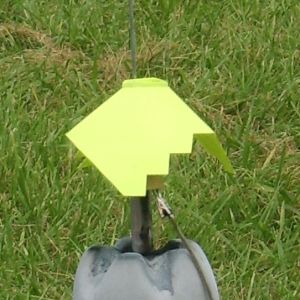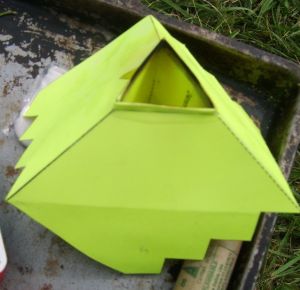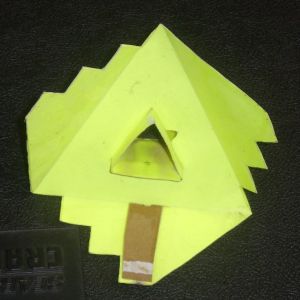Art Applewhite Rockets Super Stealth
Art Applewhite Rockets - Super Stealth {Kit}
Contributed by John Partridge
| Construction Rating: | starstarstarstarstar |
| Flight Rating: | starstarstarstarstar |
| Overall Rating: | starstarstarstarstar |
| Manufacturer: | Art Applewhite Rockets  |

Brief:
This is an Art Applewhite “saucer” kit. The kit is printed on quality card stock and although the Stealth
title might imply that it is black like the military stealth aircraft, this refers to the design of the Super Stealth
and is actually available in several colors. I chose a fluorescent yellow just so I could see it better. There is also
a choice of 18mm or 24mm motors for this kit. Both options are included in the kit so you get to choose which size you
want when you start to build. I didn't have any 24mm rockets when I built it so I decided to follow the instructions
for a 24mm and then could use 24mm motors or adapt down to use 18mm motors. I ordered over the Internet and everything
came within a couple days. This was quick and I was impressed.
Construction:
Everything needed came in a large zip lock bag and even included an extra smaller kit for free. There are three pages
of instructions and a couple more pages of heavy printed cardstock that makes up the saucer kit.
 The directions were easy to follow even for a relative newcomer like me. I've built plastic
models and a few rockets but there is nothing more difficult to do than cutting, folding, and gluing. Some care is
advised however, to follow the directions closely since this is paper and if you cut instead of fold there will be
problems. Even so, the directions are generally very clear and there are an abundance of illustrations. The directions
walk you through the construction step-by-step.
The directions were easy to follow even for a relative newcomer like me. I've built plastic
models and a few rockets but there is nothing more difficult to do than cutting, folding, and gluing. Some care is
advised however, to follow the directions closely since this is paper and if you cut instead of fold there will be
problems. Even so, the directions are generally very clear and there are an abundance of illustrations. The directions
walk you through the construction step-by-step.
This kit is not difficult to build and I had only two minor problems. After making the top and the bottom of the stealth I had trouble figuring out which way the two pieces fit together. I'm not certain that if it was a problem with the directions or just a problem getting out of my own way. In any case, it was easy to figure out and everything turned out fine. My second problem was completely of my own making. At some point I bent one side more than I should have and while it looked fine it required a minor repair. Everything fit together nicely but once again you need to remind yourself that this is cardstock so like any lightweight fins of body tubes, some care needs to be taken not to crush it. Mine tends to kind of roll around in my rocket box and despite the abuse has held up very well.
No special tools were needed except a razor knife, a metal ruler, scissors, and white glue. You can use the razor knife for everything but scissors are faster most of the time.

Finishing:
After construction is finished, it's done. The directions recommend that the finished kit be sprayed with clear coat
to protect it from moisture like the landings in wet grass we've already had. Mine looks great and is one of the
family's favorites. It would have looked even better if I had been a little more patient and wiped off some dust before
the clear coat. That was certainly not Art Applewhite's fault.
Construction Rating: 5 out of 5
Flight:
Recommended motors: 18mm:A8-3, B4-2, B6-0, B6-2, C6-0 and C6-3. 24mm: C11-0, D11P, D-12-0
I'm not always good at following directions or in being very patient. I built the 24mm version so I could use adapters and use motors of either size. For the first two launches I used D12-3s because that's what I had in my box. There were two problems. Prep is simple since everything easily fits in your hand or your lap. You just put in the igniter and igniter plug and you’re off to the launch pad. No wadding is required but if you are using a rocket with a deployment charge as I did, you will want to do take some preventive measures. On my first launch I didn't do anything and the deployment charge caught the top of the rocket on fire. It wasn't bad but it scorched things a bit.
For my second launch, I wrapped wadding around the top edge of the motor and that worked better. The directions suggest putting a ball of wadding in the forward end of the motor and holding it in place with masking tape. For my third launch we used a C6-0 with no wadding and it wasn't a problem, perhaps because the motor had space around it due to the adapter. Motor retention is just from friction between the motor and the paper walls of its holder. The directions suggest wrapping the motor with some masking tape if the fit is loose but this wasn't a problem for me.
On its maiden flight we were at a club launch and while the flight was fun something was clearly not right. The Stealth went up a bit and corkscrewed while making a noise that sounded like holding a sheet of paper out the car window. It also sounded sort of like passing gas. After some thought and a close examination, I suspected that I had somehow bent one side more than I should have and had created a weak spot the gave way under thrust. (You can see how one side is bent a little in the photo that shows the scorch marks.) The oscillation of this weak side had created the flight problem and the rude noises. I made a small slit where the top half of the kit meets the bottom and glued in a strip of thin cardboard from a Pepsi box to reinforce it. The second flight was awesome! It went straight up and on a D motor it went high. The third flight I adapted down to a C6-0, and while not as high, it was still a great flight.
Recovery:
Recovery is easy. The Super Stealth is big enough to see even at its highest altitude (although my choice of bright
yellow made it easier) and even on a D12 it came down just 10 or 20 yards form the pad. With its light weight and
tumble recovery my boys had fun trying to catch it before it hit the ground.
Flight Rating: 5 out of 5
Summary:
This is a great kit. It is inexpensive, the customer service is great, and I have had a great time flying it. The
problems that I had were almost surely my own fault and even so, with paper construction it was easily fixed. This
model will be getting flight time just about every time we go out. I like it and the kids always ask if we are flying
it. When we wear this one out we'll have to get another one (or two or three...)
Overall Rating: 5 out of 5
Other Reviews
- Art Applewhite Rockets Super Stealth By Blake Eric DeMarcy (August 3, 2008)
Brief: This is a cool high-flying rocket for such a draggy design. It is made with slow spinning in mind and can be built for either 18mm or 24mm. I chose 18mm. Construction: You get two pieces of cardstock and 3 sheets of (very clear) instuctions. Construction goes the same as the qubit and scimitar. You just have to cut jagged edges instead of curves such as the scimitar ...
 |
 |
Flights
 |
 |
Sponsored Ads
 |
 |





![Calling Marshall Applewhite [Explicit] Calling Marshall Applewhite [Explicit]](https://m.media-amazon.com/images/I/51MeUaBWTkL._SL500_.jpg)





J.R.G. (October 9, 2007)